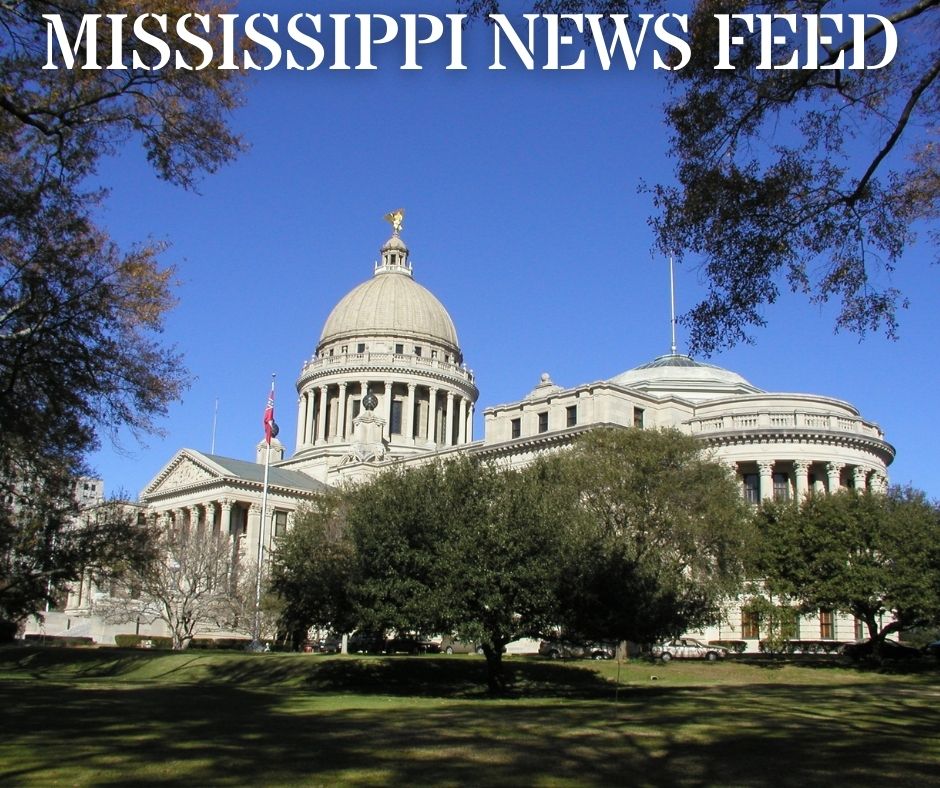Mississippi Today
A viewing guide for the debate between Gov. Tate Reeves and Brandon Presley

Republican Gov. Tate Reeves and Democratic challenger Brandon Presley will square off Wednesday night in their first and only debate before the Nov. 7 gubernatorial election.
Presley publicly challenged Reeves to multiple public debates this year, but Reeves refused to debate more than once. After much back and forth, the candidates agreed to tonight's debate — a one-hour, no commercial breaks affair.
The debate will be broadcast live Wednesday, Nov. 1 at 7 p.m. by WAPT-TV (Channel 16 in central Mississippi) and on the station's website WAPT.com. It will be simulcast live on Mississippi Public Broadcasting's TV stations, radio stations and MPBonline.org.
Note: If you're in the Jackson metro area, come to Hal & Mal's for a free Mississippi Today watch party. Doors open at 6 p.m., we'll stream the debate live at 7 p.m. on the big screen, and we'll host a few minutes of live analysis as soon as it ends. Click this link for more information and how to register. We hope to see you there!
Here's what Mississippi Today's political team is watching out for during the debate.
How will Gov. Tate Reeves perform under pressure?
Reeves, who has participated in several televised debates, has publicly made light of the fact that he's not the strongest public speaker. In previous debates, he's held his own and landed some jabs, but he is prone to become visibly flustered when pressed hard.
How will Presley do in his first major debate?
The Nov. 1 debate is Presley's first public debate of this magnitude. Privately, he's been telling supporters he's been waiting for this moment “for years.” Outside of a traditional debate setting, he's always been quick to challenge his opponents' assertions and seems to relish public speaking opportunities. But will the pressure get to him when the studio lights go on?
How nasty and personal will it get?
If you've watched television in the past three months, you've seen plenty of attacks from both campaigns. Reeves has called Presley “a liar” who is well-funded from “California and New York.” Presley has called Reeves corrupt and drawn attention to the governor's ties to the state's massive welfare scandal. The attacks should be plentiful, but can the candidates also talk substantively about policy ideas?
How might the candidates speak to undecided voters?
Public and reported internal polling from the past week or so has shown that between 5-10% of voters are still undecided . That percentage of voters absolutely could swing the election one way or another. If the voters haven't been convinced yet by the attacks of the other, it's logical to assume they want to hear ideas for how the two candidates would govern over the next four years.
How will Reeves defend his opposition to Medicaid expansion?
Presley has hammered Reeves all year for blocking a policy that would provide health coverage to at least 200,000 working Mississippians. Expansion is popular among voters, and hospitals have begged for it as they struggle to keep their doors open.
How will Presley address Reeves' attacks of being aligned with national Democrats?
This line of attack has, in the modern era, aided Republicans greatly. Presley outraised Reeves during this election cycle, largely due to the Washington-based Democratic Governors Association. Can Presley level with voters who are concerned he's tight with national Democrats?
In such a short total airtime, how much ground will WAPT cover?
It was a coup for WAPT to land this debate, given they are the smallest reach in the Jackson media market and no statewide affiliate partners. The debate will be moderated by WAPT anchors Megan West and Troy Johnson, who have a difficult task ahead of them. Can they touch on the major issues and keep the candidates from deflecting or filibustering?
This article first appeared on Mississippi Today and is republished here under a Creative Commons license.
Mississippi Today
PSC axes solar programs in light of EPA funds, advocates file lawsuit
Advocates from some of the state's conservation groups — such as Audubon Delta, Mississippi Sierra Club and Steps Coalition — spoke out Wednesday against a recent decision by the Mississippi Public Service Commission to suspend several solar programs, including “Solar for Schools,” less than two years after the previous commission put them in place.
“This is particularly disappointing because the need for these incentives in the state of Mississippi is significant,” said Jonathan Green, executive director of Steps Coalition. “Energy costs in the South, and in particular the region known as the Black Belt, are higher than those in other parts of the country for a number of reasons. These regions tend to have older energy generation infrastructure, and housing that has not been weatherproofed to modern standards. For many low- to moderate-income residents in the state of Mississippi, energy burden and energy insecurity represent real daily economic challenges.”
The PSC voted 2-1 at its April docket meeting to do away with the programs, reasoning in part that new funds through the Inflation Reduction Act would be available to the state. About 10 days later, the Environmental Protection Agency awarded $62 million to the state, through the Hope Enterprise Corporation, to help low-income Mississippians afford adding solar power to their homes. The funds are part of the Biden Administration's Solar for All program, one of the several recent federal initiatives aimed at reducing greenhouse gas emissions.
The PSC decision ended three programs the previous commission put in place to encourage wider adoption of solar power through the two power companies it regulates, Entergy Mississippi and Mississippi Power: “Solar for Schools,” which allowed school districts to essentially build solar panels for free in exchange for tax credits, as well as incentives for low-income customers and battery storage.
Last Friday, the Sierra Club filed lawsuits in chancery courts in Hinds and Harrison counties against the commission, arguing the PSC broke state law by not providing sufficient reasoning or public notice before making the changes. Advocates also argued that new funding going to Hope Enterprise won't go as far without the PSC's low-income incentives.
The programs were part of a 2022 addition to the state's net metering rule, a system that allows homeowners to generate their own solar power and earn credits for excess energy on their electric bills. Mississippi's version is less beneficial to participants than net metering in most states, though, because it doesn't reimburse users at the full retail cost. Mississippi's net metering program itself is still in tact.
Northern District Commissioner Chris Brown said that, while he supported efforts to expand solar power, he didn't think programs that offer incentives from energy companies were fair to other ratepayers.

“It's the subsidy that we take issue with,” Brown said at the meeting. “It's not the solar, it's not the helping the schools. We just don't think it's good policy to spread that to the rest of the ratepayers.”
Brown and Southern District Commissioner Wayne Carr voted to end the programs, while Central District Commissioner De'Keither Stamps voted against the motion. All three are in their first terms on the PSC. Brown's position is in line with what the power companies as well as Gov. Tate Reeves have argued, which is that programs like net metering forces non-participants to subsidize those who participate.
Robert Wiygul, an attorney for the Mississippi Sierra Club, countered that argument during Wednesday's press conference, saying that net metering actually helps non-participants by adding more power to the grid and reducing the strain on the power companies' other infrastructure. Moreover, he said, the PSC hasn't offered actual numbers showing that non-participants are subsidizing the program.
“Look, if the commission wants to talk about that, we are ready to talk about it,” Wiygul said. “But what we got here is a situation where these two commissioners just decided they were going to do this. We don't even know what that claim is really based on because it hasn't been through the public notice and hasn't been through the public comment process.”
While no schools had officially enrolled in “Solar for Schools,” which went into effect in January of last year, Stamps told Mississippi Today that there were places in his district getting ready to participate in the very programs the PSC voted to suspend.

“My issue was we should have talked to the entities that were going through the process to (understand what they were doing) to participate in the programs before you eliminate the programs,” he said.
Several school districts in the state are already using solar panels thanks to funding from a past settlement with Mississippi Power. Officials there told Mississippi Today that the extra power generated from the panels has freed up spending for other educational needs. During the public comment period for the 2022 net metering update, about a dozen school district superintendents from around the state wrote in to support the initiative. Ninety-five school districts in the state would have been eligible for the program because they receive power from Entergy Mississippi or Mississippi Power.
Former commissioner Brent Bailey, who lost a close reelection bid in November to Stamps, was an advocate for the schools program that the PSC created while he was there. At the April docket meeting, he pleaded with the new commission to reconsider, arguing that the new federal funding won't have the same impact without those programs.
“My ask is to at least give this program a chance, see where it goes, and hear from stakeholders that have participated,” Bailey said. The solar programs, he added, weren't just about expanding renewable energy, but taking advantage of a growing economy around solar power as well: “We can just stand by and watch it go by, or we can participate in this and bring economic development to the state.”
This article first appeared on Mississippi Today and is republished here under a Creative Commons license.
Crooked Letter Sports Podcast
Podcast: In or out (of the NCAA Tournament)?

College baseball's regular season is in its last week, which means baseball bracketology is a popular activity. State needs to finish strong to become a Regional host. Southern Miss probably has already punched its ticket as a 2- or 3-seed. Ole Miss, playing its best baseball presently, needs victories, period. Meanwhile, the State High School softball tournament is this week in Hattiesburg, and the state baseball tournament comes to Trustmark Park in Pearl next week.
Stream all episodes here.
This article first appeared on Mississippi Today and is republished here under a Creative Commons license.
Did you miss our previous article…
https://www.biloxinewsevents.com/?p=358148
Mississippi Today
Reeves again blocks funds for LeFleur’s Bluff project in Jackson
For the third consecutive year legislative efforts to direct state money to renovate LeFleur's Bluff in Jackson have been stymied, thanks in large part to Gov. Tate Reeves.
Earlier this week, the Republican governor vetoed a portion of a bill that directed $14 million to the office of Secretary of State Michael Watson for work on developing and improving a nature trail connecting parks and museums and making other tourism-related improvements in the LeFleur's Bluff area.
It is not clear whether the Legislature could take up the veto during the 2025 session, which begins in January, though, that's not likely. The Legislature had the option to return to Jackson Tuesday to take up any veto, but chose not to do so.
Of the project, Watson said, “Our office was approached late in the session about helping with a project to revitalize LeFleur's Bluff. As Mississippi's state land commissioner, I was more than happy to help lead this effort not just because it's a natural fit for our office, but also because I believe Mississippi needs a thriving capital city to retain our best and brightest. Investing state funds in state property on a project to enhance the quality of life in Jackson makes good sense.
“Unfortunately, some only support it when it equates to campaign contributions. Sadly, through the line-item veto of the appropriation, Mississippians will once again wait another year for the opportunity to benefit from state investments for the greater public good.”
Various groups, such as representatives of the Mississippi Children's Museum and many other community leaders have been working on the project for years. The area already is the home of the Children's Museum, Museum of Natural History, Mississippi Sports Hall of Fame and Museum and a state park.
The issues with LeFleur's Bluff first arose in 2022 when Reeves vetoed a $14 million appropriation that in part was designed to redesign and create a new golf course in the area. Previously, there had been a nine-hole, state-owned golf course operated by the Department of Wildlife, Fisheries and Parks at LeFleur's Bluff State Park.
In 2022, the LeFleur's Bluff project was one of literally hundreds of projects funded by the Legislature – many of which was tourism projects like LeFleur's Bluff. The governor only vetoed a handful of those projects.
When issuing the LeFleur's Bluff veto, Reeves said the state should not be involved in funding golf courses.
Then last year $13 million was directed to the Department of Wildlife, Fisheries and Parks to spend on the LeFleur's Bluff project. But legislative leaders said state money would not go toward a golf course.
Lawmakers opted to transfer the project to the Secretary of State's office late in the 2024 session, apparently in part because they felt the Department of Wildlife, Fisheries and Parks had not made enough of an effort to begin the project.
Lynn Posey, executive director of Wildlife, Fisheries and Parks, said that before moving forward with the project, “We felt like we needed to do engineering work and see what the situation was. We never got a chance to move forward” because the Legislature redirected the money.
Posey said an engineer's report was needed because “it is a unique piece of land.” He said much of the land is prone to flooding.
He said before that work could begin the Legislature switched the authority to the Secretary of State's office. Posey was appointed to his current position by Reeves, whose office had no comment on the veto.
Lt. Gov. Delbert Hosemann said after the governor's veto, “Projects like the LeFleur's Bluff development are critical to the Capital City, the wider metropolitan area, and our state. Public parks add to the quality of life for our citizens. I am hopeful the individuals involved in this project, including those at the Mississippi Children's Museum, will continue their work to improve this state asset.”
While the Constitution instructs the governor to provide to the Legislature a reason for any veto, Reeves did not do so this year when vetoing the money going to the Secretary of State's office.
On Monday, the governor also vetoed a portion of another bill dealing with appropriations for specific projects. But in this case, the veto was more of a technicality. The bill was making corrections to language passed in previous sessions. In that language were five projects the governor vetoed in 2022.
The language, as it was written, would not have revived those previously vetoed projects, the governor said. But Reeves said he vetoed the five projects out of caution. He did the same in 2023 when those five projects, which included money appropriated in 2022 for the Russell C. Davis Planetarium in Jackson, were carried forward in a bill also making corrections to previously passed legislation.
This article first appeared on Mississippi Today and is republished here under a Creative Commons license.
-
SuperTalk FM3 days ago
Martin Lawrence making 3 stops in Mississippi on comedy tour
-
Our Mississippi Home2 days ago
Beat the Heat with Mississippi’s Best Waterparks
-
Mississippi News6 days ago
Man arrested for allegedly breaking into home, robbing owner
-
Mississippi Today6 days ago
Lawmakers may have to return to Capitol May 14 to override Gov. Tate Reeves’ potential vetoes
-
SuperTalk FM6 days ago
Couple arrested after husband received unemployment benefits while in prison
-
Our Mississippi Home2 days ago
Charlie’s U-Pik: Opening Soon for the Summer Season
-
Mississippi News Video5 days ago
Local dentists offer free dental care in Amory
-
Mississippi News5 days ago
Bond set for West Point couple accused of killing their child


























![HIGH SCHOOL SOFTBALL: Vancleave @ East Central (5/9/2024) [5A Playoffs, South State]](https://www.biloxinewsevents.com/wp-content/uploads/2024/05/1715460379_maxresdefault-80x80.jpg)








